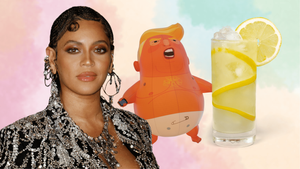A video posted by the Donald Trump election campaign that featured Beyoncé track ‘Freedom’ has been taken down, seemingly after her label and publisher sent a cease and desist letter.
The track from 2016 album ‘Lemonade’ has been repeatedly used by the Kamala Harris campaign, but with authorisation. The Democrats have also got permission to use Neil Young’s ‘Rockin In The Free World’ at their campaign events, while Trump himself has commented on an AI-generated image of Taylor Swift he shared on social media that urged people to vote for the former President. It’s been a busy week for presidential campaigns meet pop music stories.
Trump campaign officials were presumably referencing the Democrats’ frequent use of ‘Freedom’ when they decided to insert the track into a campaign video. That video was posted to X by Trump campaign spokesperson Steven Cheung and included footage of Trump walking off a plane. Following reports that Beyonce’s label and publisher had issued a cease and desist in relation to the unapproved use of ‘Freedom’ in the campaign ad, Cheung deleted his post.
As CMU explained earlier this week, after the Isaac Hayes estate sued the Trump campaign over its use of the song ‘Hold On, I’m Comin’, the rules around politicians using music can be complicated. If the music is played at an event in the US, permission is only required for the song not the recording, and that can usually be covered by a blanket licence from the music industry’s collecting societies like BMI and ASCAP.
However, the societies’ licences for political campaigns allow individual songwriters to exclude songs from the licence. BMI has confirmed that ‘Hold On, I’m Comin’ has now been withdrawn from the political entity licence it issued to the Trump campaign, and some other campaigns, meaning future use of the song at Trump events will definitely not be covered and the former President’s team would need to get bespoke permission from the Hayes estate.
The Hayes estate is not the first to go legal over Trump’s use of music at his events, despite the complexities around the blanket licences. Neil Young filed a lawsuit in 2020 having first complained about Trump’s use of ‘Rockin In The Free World’ as far back as 2015. The litigation was ultimately dismissed, presumably after a settlement was reached.
Trump’s past run-ins with Young may have in part motivated the Democrats to play ‘Rockin In The Free World’ as Harris’s vice presidential nominee Tim Walz took to the stage at this week’s Democratic National Convention. According to CNN, not only was that use of the song approved by Young, but Walz personally sought permission from the musician.
With campaign videos, like the one posted by Cheung featuring ‘Freedom’, things are generally more straightforward in copyright terms.
That's a synchronisation which is not covered by any BMI or ASCAP licence, meaning permission must be sought from the relevant label and publishers. It’s unlikely the music licences held by social media platforms would cover videos of that kind, plus - as with this video - they are often posted to X, which doesn't have any music licences.
That makes it easier for an artist to get campaign videos that contain unapproved music taken down from social media platforms. They - or their labels or publishers - could also sue, as Eddy Grant did in relation to a Trump campaign ad from 2020 that featured his track ‘Electric Avenue’. That said, takedowns are much more common than lawsuits in this domain.
Talking of pop stars suing Trump, there was speculation this week as to whether Taylor Swift might have her lawyers target the former President after he shared an image featuring an AI-generated representation of the pop star with the strapline “Taylor wants you to vote for Donald Trump”. Needless to say, Swift has not formally endorsed the Trump campaign.
There could be various legal grounds on which Swift could take action over the image, while Trump’s use of it also plays into the ongoing debate about how performers can control the use of their likeness in the context of generative AI.
Trump was asked whether he was worried about possible legal action from Swift during an interview with Fox Business Network correspondent Grady Trimble yesterday. According to The Hill, Trump was adamant that, although he shared the image on his own Truth Social platform, he had no role in creating it.
He said that he didn't know anything about the image - and others included in the same post - except that “somebody else generated them. I didn’t generate them”.
Although he didn't go into much more detail about his sharing of those images, he did concede that he has concerns about the use of AI to generate misleading images and videos. Though, clearly not enough concerns to stop sharing such images himself.
“It’s happening with me too”, he said. “They’re making - having me speak. I speak perfectly, I mean absolutely perfectly on AI, and I’m, like, endorsing other products and things. It’s a little bit dangerous out there”.

